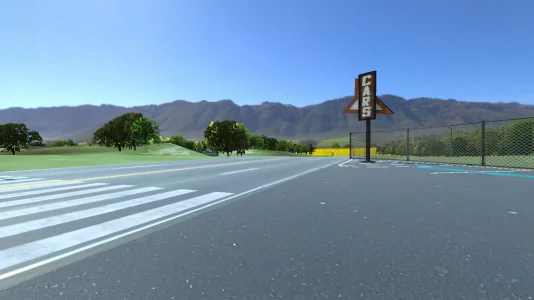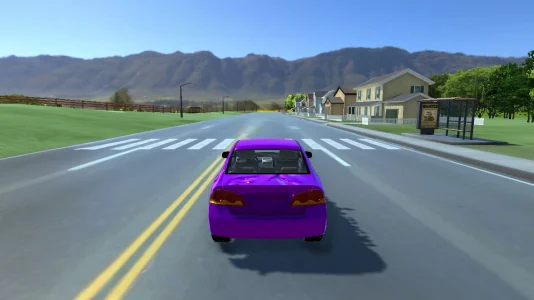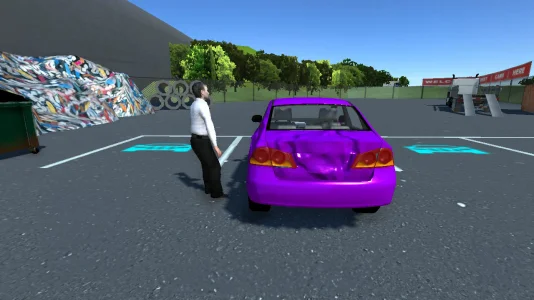Download Car Trader Simulator MOD Free
Car Trader Simulator is a single-player vehicle management simulation game developed by GamesEZ. In this casual tycoon title, the central objective involves building a car trading business from minimal resources. Players engage in a core gameplay loop of acquiring, assessing, renovating, and selling vehicles for profit. Success is measured by reinvesting earnings to upgrade facilities, manage personnel, and expand the automotive empire.
Preview Images




Car Trader Simulator Details
An In-Depth Analysis of Car Trader Simulator
Car Trader Simulator 2025 presents a comprehensive vehicle management and business simulation experience tailored for the mobile gaming market. This analysis provides a detailed examination of its core mechanics, technical specifications, and operational framework, leveraging an expert guide to inform prospective players. The title, developed for Android and accessible on Windows PC, places players in the role of an aspiring automotive entrepreneur tasked with building a car trading empire from the ground up. Its design philosophy balances complex tycoon features with the accessibility expected from a casual mobile game, creating a distinct niche within the car sim genre.Development, Publishing, and Genre Classification
The game is an intellectual property of GamesEZ, a development studio formally known as EZ Games. Based in Ho Chi Minh City, Vietnam, the studio was established in 2020 by founders Robert Vu and Sylvie Hoang. GamesEZ has cultivated a portfolio that heavily emphasizes casual and 'Idle' Tycoon simulation games, a background that informs the structural design of Car Trader Simulator. While the game promises deep simulation elements, its developer's history suggests these mechanics are streamlined for a broader audience, resulting in a 'Tycoon Lite' experience that prioritizes engagement over the granular complexity found in dedicated PC titles. Car Trader Simulator is officially categorized within the Simulation genre, with a specific focus on Vehicle Management and Car Dealing. It is designated as a Single player experience, offering confirmed Offline functionality, which makes it highly suitable for gaming during commutes or in areas with limited internet connectivity. The application is primarily developed for the Android platform, with the package identifier com.gametov.carforsale, but is also available for Windows PC users through the Google Play Games client. The developer maintains an active update schedule, with the latest version V9.1 released on October 7, 2025, indicating an ongoing commitment to addressing performance and content issues.Core Gameplay Mechanics and Simulation Systems
The central objective in Car Trader Simulator is business management, built around a profitable economic cycle. The player's journey involves progressing from a small-scale car flipper to the proprietor of a vast automotive empire. This progression is achieved by mastering a fundamental gameplay loop that requires strategic decision-making at every stage.The Economic Cycle: Acquisition to Sales
The gameplay is founded on a four-stage process that drives revenue and business expansion. Success is contingent on the player's ability to optimize each phase of this cycle to maximize profit margins and reinvest capital effectively.- Acquisition: Players source their vehicle inventory from diverse in-game locations, including residential areas, dedicated car markets, ports, and auctions. The initial strategy involves identifying undervalued or damaged vehicles to secure a low entry cost.
- Assessment: A critical component of the simulation involves the detailed inspection of each acquired vehicle. This process allows the player to accurately determine its market value, identify necessary repairs, and calculate the potential for profit.
- Renovation: Profits are reinvested into the business to enhance vehicle value. This includes hiring skilled mechanics for repairs and upgrades, as well as improving the showroom to attract more affluent buyers and justify higher asking prices.
- Negotiation: The final stage involves engaging in strategic negotiations with potential customers. This requires a keen understanding of profit margins, buyer resistance, and turnover speed to secure the most lucrative deals possible.
Advanced Management and Logistical Layers
Beyond the primary vehicle flipping loop, Car Trader Simulator incorporates detailed management systems characteristic of the Tycoon genre. Players must manage a growing inventory, strategically upgrade their showroom and garage infrastructure, and monitor dynamic market fluctuations and customer preferences to stay competitive. A significant layer of complexity is introduced through personnel management, requiring players to hire employees like mechanics and drivers, each with distinct experience levels and employment costs. The simulation extends to logistics, featuring advanced functions such as the ability to plan delivery routes for staff across a strategic map, adding a tactical dimension to operational efficiency.Game Modes and Progression Structure
The application is designed as a single-player experience, focusing entirely on an entrepreneurial campaign that guides the player through the intricacies of the car trading business. The game’s structure supports long-term engagement by gradually introducing new mechanics and challenges.The Single-Player Tycoon Campaign
The primary game mode is a persistent Tycoon campaign where the player starts with minimal capital and must build a successful business. Progression is marked by sequential milestones, such as acquiring the first vehicle, negotiating initial sales, and reinvesting profits into showroom upgrades. This guided path serves as an extended tutorial, introducing core concepts while providing a narrative framework centered on becoming the ultimate car trading mogul through achievements and rewards. While some simulation titles feature complex branching narratives, this game's campaign focuses on a linear progression of economic growth and operational expansion.Transition to Sandbox Free Play
The inherent design of tycoon simulation games suggests that once the main campaign objectives are completed, the experience transitions into an open-ended Sandbox or Free Play state. In this phase, the focus shifts from guided missions to the endless pursuit of wealth maximization and business expansion. Players are free to manage their empire without predefined objectives, allowing for long-term strategic planning and optimization. The absence of PvP or cooperative multiplayer functionality means competition is simulated through AI-controlled rival dealers and dynamic auction environments.Technical Requirements and Performance Considerations
Running Car Trader Simulator effectively requires adherence to specific hardware and software specifications, particularly due to its resource-intensive 3D simulation engine. The game's stylized but detailed graphics contribute significantly to its performance demands and reported stability issues.Android and PC Specifications
For mobile users, the minimum required operating system is Android 9 (Pie) or higher. The APK file size is substantial, ranging from 218.5 MB to 250.5 MB, with a total storage footprint that can exceed 500 MB after installation. Due to frequent reports of crashes and data loss, a device with at least 4 GB of RAM and a mid-tier Quad-Core 64-bit CPU is strongly recommended for stable operation. Accessing the game on Windows via the Google Play Games client demands significantly higher specifications, including Windows 10, 8 GB of RAM, a processor with 4 physical cores, and 10 GB of SSD storage space, confirming the application's demanding nature.Critical Stability Flaws and Data Integrity
A comprehensive analysis of Car Trader Simulator cannot overlook the most significant issue reported by its global user base: severe system instability. While the game offers deep strategic elements, its technical execution is undermined by a fundamental flaw in its data management system. The most consistent user complaint involves the catastrophic failure of the auto-save system, which frequently leads to a complete reset of player progress, including currency, inventory, and showroom upgrades, following an application crash. This recurring issue stands in direct contradiction to the long-term investment required by a complex management simulation, severely impacting the player experience. The community has urgently requested the implementation of a manual save option to mitigate this critical data integrity crisis.Monetization Model and In-App Purchases
Car Trader Simulator employs a hybrid Free-to-Play (F2P) monetization model, integrating both advertisements and in-app purchases (IAPs). The game is fully playable without spending real money, though progression requires significant time investment and exposure to ads. The IAP system likely offers options to accelerate progress, such as purchasing in-game currency or instantly completing tasks, consistent with the developer's background in 'Idle' tycoon games. Advertisements are deployed as both optional, incentivized videos that grant rewards and as forced interstitial ads that interrupt gameplay. However, the game's known data integrity risk makes investing real money into IAPs a substantial financial gamble, as purchased assets can be lost due to the progress-resetting bug.Final Conclusion and Recommendation
Car Trader Simulator 2025 offers an engaging and visually appealing simulation concept built upon an addictive economic loop of buying, renovating, and selling vehicles. Its status as a fully offline, single-player experience adds significant value for players seeking a game that does not require a constant internet connection. However, these strengths are fundamentally compromised by a severe and persistent technical flaw in its auto-save system. The high probability of losing all accumulated progress due to application crashes makes long-term investment in the game a volatile proposition. The title is best suited for casual tycoon enthusiasts who are tolerant of high operational risk and understand the potential for sudden progress resets. Until developer GamesEZ addresses the core data integrity issue, prospective players should approach this otherwise compelling car dealing simulation with caution.Understanding the Core Gameplay Loop in Car Trader Simulator
Car Trader Simulator immerses players in a detailed single-player Tycoon simulation environment. The game’s primary objective requires players to establish a successful car business empire from minimal resources. Player progression depends on mastering a fundamental economic cycle that forms the core gameplay loop. This loop challenges the player’s ability to identify value, manage resources, and negotiate effectively within a dynamic automotive market. The experience is designed for offline play, allowing for long-term strategic decision-making without a constant internet connection.
The Entrepreneurial Profit Cycle
The fundamental gameplay revolves around a four-stage process of vehicle trading. The first stage is acquisition, where the player sources vehicles from diverse in-game locations. These locations include residential areas, dedicated car markets, ports, and auctions. Success in this phase requires the player to identify undervalued or damaged vehicles that offer high profit potential. After acquisition, the player engages in a detailed assessment of each vehicle. This inspection process is critical for determining a car’s true market value and calculating the necessary investment for repairs.
The third stage, renovation, involves strategically reinvesting profits. Players hire skilled mechanics to enhance vehicle value through repairs and upgrades. The renovation phase also includes improving the business showroom to increase the appeal of the overall inventory. The final stage is sales negotiation. This requires astute calculation of profit margin versus turnover speed. The player must strategically negotiate with potential buyers to secure the most profitable deals, completing the cycle and generating capital for further expansion.
Business Management and Expansion
Beyond individual car flipping, the game incorporates deep business management mechanics. Players manage a growing inventory of vehicles, which demands constant upgrades to the showroom and overall business infrastructure. These upgrades allow the business to handle more numerous and higher-value cars. Personnel management is another significant component of the simulation. Players hire various employees, including mechanics and drivers, who differ based on their experience, specialization, and employment cost. Strategic staffing is essential to accelerate growth, maintain repair quality, and expand operational capacity.
The simulation also includes a dynamic market. Players must remain vigilant regarding in-game market trends, customer preferences, and news events. This information allows players to adjust inventory and advertising strategies effectively to attract more buyers. Advanced logistical functions, such as planning delivery routes for personnel across the game’s map, add another layer of strategic complexity to the management experience.
Player Progression and Campaign Structure
The game provides a structured progression path through its primary career mode. This campaign guides the player from a novice enthusiast into a dominant car trading mogul. The progression system is tied to sequential milestones that gradually introduce more complex mechanics and higher-stakes opportunities. As the player completes campaign objectives, the experience likely transitions into an open-ended state that allows for limitless business management.
From Novice Trader to Business Mogul
The central campaign mode places the player in the role of an entrepreneur with minimal starting resources. Progression is directly linked to the expansion of the business through reinvested profits. Early missions guide the player through acquiring initial inventory, negotiating the first few sales, and making foundational upgrades. Completing these guided tasks unlocks achievements and provides rewards that fuel further growth. Some simulation titles offer branching narrative paths based on moral choices, such as a “Lawful” versus a potentially illicit “Mafia” route. Adhering to the lawful path typically involves lower risk and better long-term reputation building, which is advisable for new players.
Transitioning to Open-Ended Sandbox Play
The inherent nature of tycoon simulation games suggests a transition to a free play state after the main campaign missions conclude. Once the initial set of goals and guided objectives are completed, the game’s focus shifts entirely to maximizing wealth and managing the business without pre-defined tasks. In this open-ended sandbox mode, the player can engage in endless accumulation and expansion. The core objective becomes self-directed, focusing on optimizing every aspect of the car trading empire to dominate the simulated market.
Foundational Strategies for New Players
A new player’s journey in Car Trader Simulator begins with a mandatory tutorial. This walkthrough introduces the foundational mechanics of acquiring a vehicle, learning the inspection process, and concluding a sale. Following this introduction, strategic decision-making becomes paramount for survival and growth. Early choices in capital management, infrastructure investment, and risk assessment will determine the long-term viability of the business.
- Prioritize Capital Management: Players begin with limited seed money. Initial purchases must focus on affordable, low-risk vehicles to ensure minimal capital exposure. Successfully flipping several low-cost cars generates immediate cash flow required for expansion.
- Invest in Infrastructure Before Inventory: Early profits should be reinvested into upgrading the physical capacity of the business. Expanding the showroom and garage before stocking a large inventory enables higher turnover and prepares the dealership to manage more valuable cars.
- Master Negotiation Skills: The profit margin is often decided during the final negotiation phase. New players must learn to identify a buyer’s resistance level and strike deals that maximize return without losing the sale entirely.
- Manage Financial Risk: Players should avoid premature involvement in high-risk ventures like major auctions. A substantial and stable cash reserve must be established first to absorb potential losses from poor investments.
Advanced Techniques and Critical Risk Mitigation
For players aiming to build a dominant car trading empire, mastering advanced strategies focused on market intelligence and logistical efficiency is essential. However, the most critical strategy involves compensating for a core technical flaw in the game: the volatility of saved progress. Defensive gameplay is necessary to protect the player’s time and resource investment.
Optimizing Profitability and Efficiency
Advanced players can leverage staff specializations to maximize operational speed. Employing a master mechanic, despite the higher employment cost, can drastically reduce vehicle repair times and directly increase cash flow. Logistical optimization provides another key advantage. Players can purchase larger trailers for their drivers, which function as overflow inventory space and reduce the immediate need for expensive garage expansions. Utilizing the strategic map feature to plan efficient road maps for staff minimizes travel time and maximizes employee utilization, which is crucial when managing a large, scattered inventory.
Mitigating Data Integrity Failure
The game’s auto-save system is reportedly prone to failure, especially following an application crash. This technical flaw frequently results in the complete loss of money, cars, and progress. Players must adopt a defensive strategy to mitigate this risk. After every significant transaction, such as selling a rare car or winning a major auction, the player should immediately exit the application via the in-game menu. This action increases the chance of triggering a stable save cycle. Players must never exit the application via a force-close, as this almost guarantees data corruption. Maintaining a large liquid cash reserve is also paramount, as it acts as a financial buffer against catastrophic losses caused by a save file reset.
